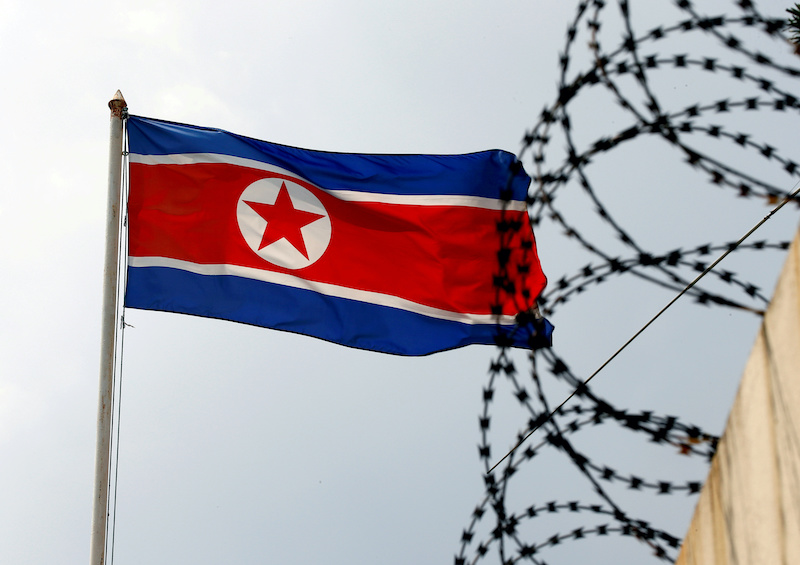Poor conditions for North Koreans working overseas have led to “incidents and accidents”, according to South Korea’s intelligence agency.
The remark came after reports of rare protests and unrest in northern China among workers from a North Korean military-linked trading company.
Fed up with unpaid wages and lingering pandemic lockdowns, as many as 3,000 North Korean workers in China staged protests last month, according to two South Korean government-affiliated researchers, including a former North Korean diplomat.
News of the protests, which Reuters said it could not independently confirm, comes at a time when Pyongyang appears to have ended all economic cooperation with South Korea.
ALSO SEE: China’s Electric Vehicle Sales Fell 37% in January from December
North Korea’s state-run news agency reported on Thursday that Pyongyang had abolished laws on inter-Korean economic cooperation, including the special zone for international tours of Mount Kumgang and others for enforcing over 100 economic agreements with the South, according to a report by Radio Free Asia.
The move comes weeks after Pyongyang decided to abolish agencies handling inter-Korean affairs, it said.
A Chinese foreign ministry spokesperson said they were “not aware” of the North Korean protests when asked about it at a daily briefing on Thursday. The North Korean embassy in Beijing and its consular office in the Chinese border city of Dandong did not respond to calls seeking comment.
Large-scale protests by North Koreans are virtually unheard of, and the researchers said it suggests these labourers are caught in a disagreement over their fate: China wants to send them home to comply with UN resolutions and avoid defections, but North Korea wants to maintain the number of labourers there.
Pyongyang exerts tight control over its overseas workers, including seizing as much as 90% of their wages for government funding, according to the 2023 US State Department Trafficking in Persons Report, which said they often face “conditions amounting to forced labour”.
For some workers, wages are withheld until they return to North Korea, increasing their vulnerability to coercion and exploitation by authorities, the report said.
Recent moves appear to have worsened conditions, the researchers say.
Unpaid wages, poor conditions at textile factories
Cho Han-bum, a senior researcher at a South Korean government-run think tank, Korea Institute for National Unification (KINU), said in an interview that North Korean workers at more than 10 textile factories in Helong, a city in Jilin province near the border, staged violent protests over unpaid wages.
The wages totalled about $10 million over four to seven years, according to Cho, adding that North Korean government officials paid several months’ worth of salaries to the disgruntled workers to end the dispute.
Ko Young-hwan, a North Korean diplomat-turned-defector who now advises the South Korean unification minister, said in an interview that officials from the North Korean consulate in China had been sent to Jilin province and were trying to keep the situation under control after angry workers held some managers hostage.
“Various incidents and accidents have been happening due to poor living conditions of North Korean workers dispatched overseas, so we are checking on related movements,” South Korea’s National Intelligence Service (NIS) said in response to questions about unrest, without elaborating.
A 2017 UN Security Council resolution, which China backed, demanded that countries repatriate all North Korean workers by December 2019, on the grounds that their labour was exploited to earn foreign currency for North Korea’s banned nuclear and ballistic missile programs.
At the time, Beijing said it had repatriated more than half but did not specify a figure. There are an estimated 20,000-100,000 North Koreans working in China, primarily in restaurants and factories, according to the US State Department.
Covid restrictions caused border lockdowns
South Korea’s unification ministry said in a report last year that China and Russia were hosting North Korean workers despite the sanctions. The Russian government has said Covid restrictions were making repatriations difficult.
Cho and Ko declined to identify their sources due to security reasons, but Ko said his sources included North Korean bureaucrats based in China.
The dissatisfied North Korean workers, dispatched by a trading company operated by the country’s military, have been unable to return home from China for several years because of Covid border lockdowns, they said.
The NIS said that discussions between China and North Korea appeared to be under way and that the agency was monitoring any relevant movement, without providing further details.
“Discontent among those workers has been brewing,” Cho said. “Now that the border is reopening, those workers want to go home. That’s not easy now, given the North Korean regime wants to keep them in China to raise money for the government.”
- Reuters with additional input and editing by Jim Pollard
NOTE: Additional details were added to this report on February 8, 2024 about North Korea allegedly scrapping laws, agreements and agencies related to inter-Korean dealings.
ALSO SEE:
North Korea Using AI to Boost Surveillance, Study Claims
North Korea Hackers Share Networks With SE Asia Crime Gangs
US Seizes Website Domains Used by North Korean IT Workers
North Korea Declares Itself a Nuclear State, Vows More Missiles
North Korea Leader Kim Orders War Preparations, Sacks General
























